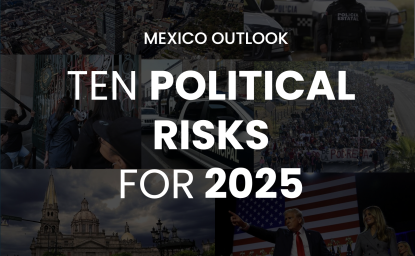The World Justice Project recently released its 2019 Rule of Law Index. This year’s index results are quite discouraging for Mexico.
Last year, Mexico ranked 97th in the Rule of Law Index. Now it occupies the 99th place out of 126 countries, with an overall score of 0.45 (1 being the highest score).
The index analyzes nations’ adherence to the rule of law by taking into account eight factors: constraints on government powers, absence of corruption, open government, fundamental rights, order and security, regulatory enforcement, civil justice, and criminal justice. The scores and rankings presented in the index come from surveys of more than 120,000 households and 3,800 legal experts, rendering it the most accurate portrait of global adherence to the rule of law.
Regionally (Latin America and the Caribbean), Mexico ranked 26th out of 30 countries, doing slightly better than countries like Nicaragua, Honduras, Bolivia, and Venezuela. When measuring the rule of law around the world by income (upper middle income), Mexico ranked 35th out of 38 countries, doing somewhat better than Turkey, Iran, and Venezuela.
These rankings become problematic when taking into consideration that Mexico’s major trading partners, Canada and the United States, ranked 8th and 20th, respectively. Furthermore, countries such as Denmark, Norway, Finland, and Sweden, which Mexico aspires to emulate in terms of social welfare and social equity, lead the rankings in all the factors.
Why is this relevant? Because as the authors of the index point out, the rule of law influences the daily life of every citizen and sector of society. For example, the rule of law profoundly affects citizens’ physical safety, job creation, business environment, public works, public health, and the environment. In all cases, the premise is simple: in all areas, certainty in the rules is required, as well as the proper foundations for their measurement and evaluation.
Paradoxically, Mexico’s best score, out of the eight factors taken into account by the index, is in the open government category, where it obtained a score of 0.61. This means that the mechanism put in place to allow citizens to obtain governmental information, take part in the public policymaking process, and guarantee the quality of public information are working.
This contradicts the voices that, at present, question the role of civil society and technical experts, while evidence suggests that they are indispensable to promote better governments. It is not a coincidence that Nordic countries scored the highest rankings in the index. If the goal is to resemble countries like Denmark and Norway, the Mexican government and society have to work together to improve the country’s scores and rankings
This article was originally published on El Heraldo de México.
Author


Mexico Institute
The Mexico Institute seeks to improve understanding, communication, and cooperation between Mexico and the United States by promoting original research, encouraging public discussion, and proposing policy options for enhancing the bilateral relationship. A binational Advisory Board, chaired by Luis Téllez and Earl Anthony Wayne, oversees the work of the Mexico Institute. Read more

Explore More
Browse Insights & Analysis
Imamoglu’s Arrest Sparks Nationwide Unrest and Raises Fears for Turkish Democracy



